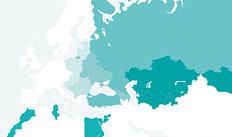Chapter 3
Executive Summary
A eurozone-based “banking union” which would create an ECB-led single supervisor and pave the way for the direct recapitalisation of failing banks from the European Stability Mechanism (ESM) is likely to be crucial for making the eurozone more stable. But would it also address the deficiencies of nationally based supervision and resolution of multinational banks which have plagued financially integrated Europe in the last decade? Multinational banks have been a force of financial development and growth, but they have also exacerbated credit booms, adding to the pain of crises – particularly in emerging Europe. The prevention and mitigation of these crises has been complicated by poor coordination and conflicts of interest between the home and host countries of these banks.
Current official banking union proposals address these problems only in part, and may introduce some new complications. Bank resolution would still be handled by national authorities. Apart from continued coordination problems in resolving failing multinational banks, this could lead to moral hazard, since national authorities may not have the incentives to minimise fiscal losses when resources for recapitalising banks are available at the European rather than the national level. Furthermore, non-eurozone members could not access the ESM even if they opt into the single supervisory mechanism, putting the banking systems of these countries at a potential disadvantage.
A number of extensions or modifications to the proposed banking union may alleviate these and related concerns. In the absence of a European resolution authority, cross-border stability groups involving the European Central Bank (ECB) and the authorities of both home and host countries of multinational banks could help improve crisis management and develop burden-sharing models. To assuage concerns that the ECB might not be as concerned about local stability as national supervisors, the latter should be given a strong voice in the governance of the ECB’s supervisory function, and retain certain macro-prudential instruments. Lastly, countries receiving ESM support could be required to share banking-related fiscal losses up to a pre-determined level.
Non-eurozone countries that opt into the supervisory mechanism should also have access to the possibility of direct recapitalisation by the ESM. In addition, intermediate options could be considered for European countries that either cannot or do not want to become full members of the banking union. This could include an “associate member status” through which non-eurozone countries would benefit from ECB liquidity support but not from fiscal support, and sharing of supervisory responsibility for multinational groups between the ECB and host country authorities.







